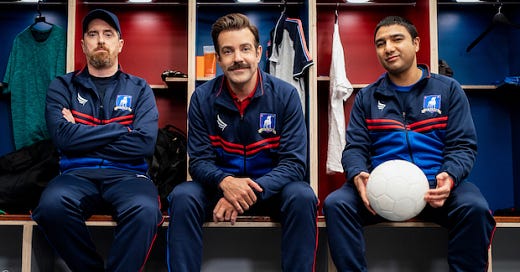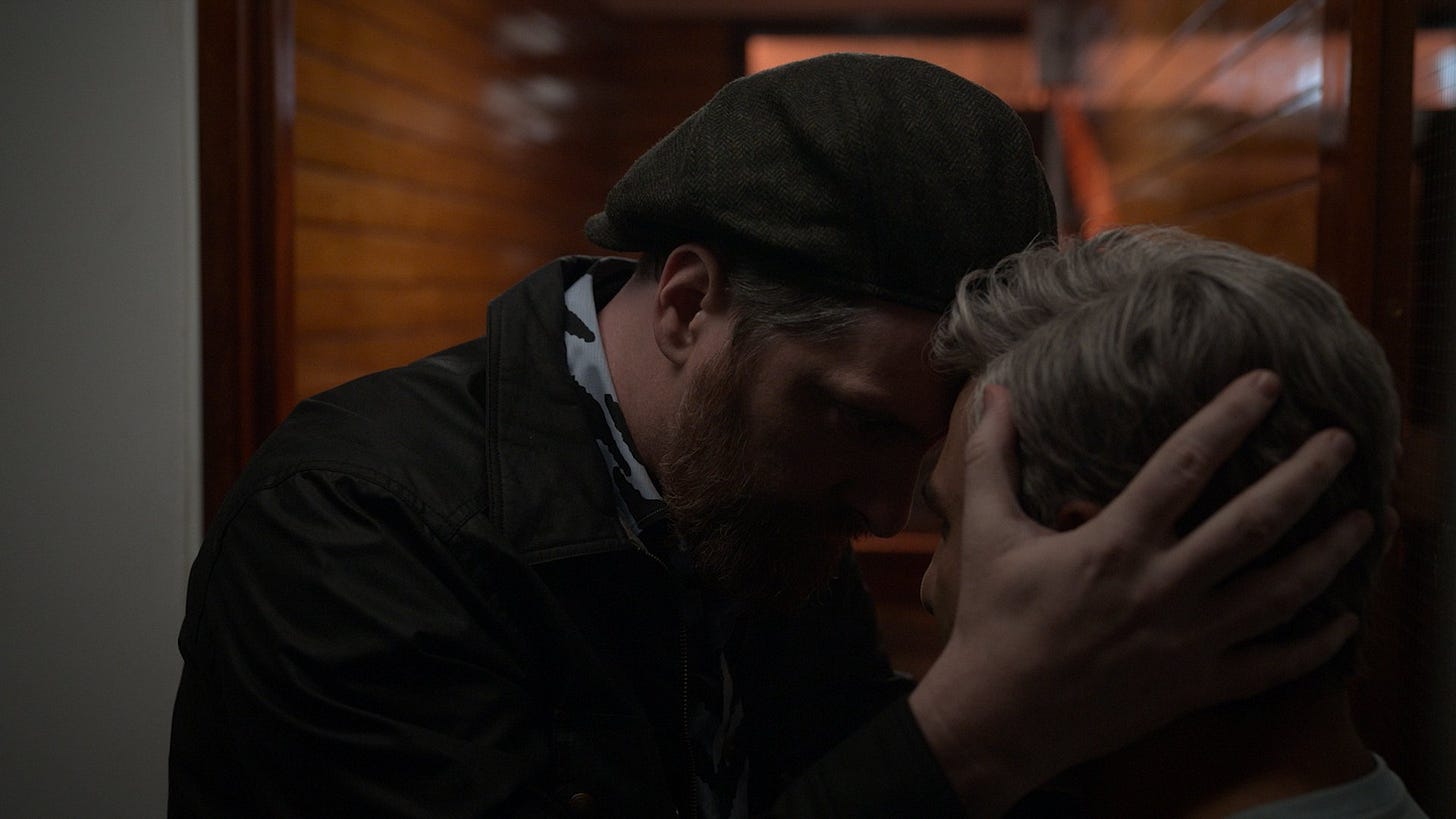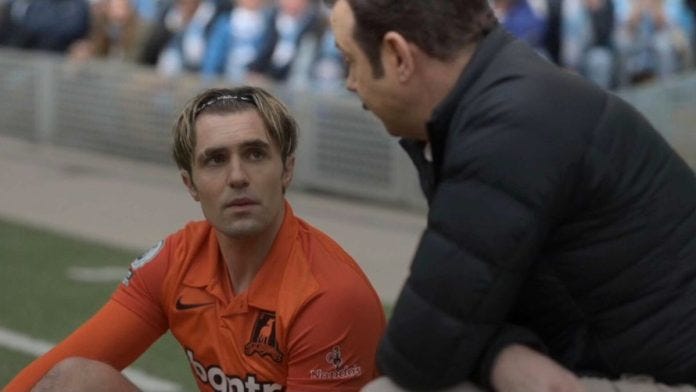The Ted Lasso Relationship Guide: Nate as the Prodigal Son
Learning to forgive as an act of self care
Like most people, I found Ted Lasso after it had been released and when some buzz was starting to build around it. We were in the midst of a global pandemic, a bit of a racial reckoning, and a contentious (though we didn’t know how contentious) election cycle, and here was a show that centered on kindness, and largely masculine kindness at that. In a world filled with cynicism and anger and fear, this was a story that embraced belief and joy and trust.
It’s part of why I have a hard time calling myself a critic when it comes to this show. I love it pretty unabashedly and I just accept it for what it is. In season 2, episode 5, “Rainbow,” Ted goes through a whole bit about rom-coms and their structure. In it, he says,
“Gentlemen, believing in rom-communism is all about believing that everything's gonna work out in the end. Now these next few months might be tricky, but that's just 'cause we're going through our dark forest. Fairy tales do not start, nor do they end in the dark forest. That son of a gun always shows up smack-dab in the middle of a story. But it will all work out. Now, it may not work out how you think it will or how you hope it does, but believe me, it will all work out. Exactly as it's supposed to. Our job is to have zero expectations and just let go.”
I decided that I was going to just let go and see where the story of Ted Lasso would take me. It wasn’t entirely blind trust - the first season was beautifully written and structured, so I believed that, even in the moments when I had some low skepticism about the track of the last two seasons, it would all work out exactly as it was supposed to, and with the finale, I believe that it did just that.
There is a lot to unpack from the finale, and I will likely keep the Relationship Guide posts going for a while, even now that it’s over, but today, I want to talk about the reconciliation that we were all looking forward to between Nate and Ted.
Through the episode, we see that Nate is back with the team, after his interaction with Beard last week. He is serving as an assistant kit man (or assistant to the kit man - I did not have a The Office reference on my radar), back in his more lowly station, but seemingly happy there. But even though he is back, it doesn’t appear that he and Ted have had much in the way of interaction.
Ted catches Nate looking at the empty spot where the Believe sign hung. He walks in, startling Nate out of his reverie. They look at the empty spot together for a beat, and then Nate begins his apology. Before he can continue, Ted tells him that it’s okay, but Nate needs to say the words.
Despite the 60 page apology letter that he was working on last week, all Nate is able to get out is a tearful, “I’m sorry.” (Can we please make sure that Nick Mohammed wins an Emmy this season?)
Something that struck me as I was watching that scene and thinking back on Nate’s story from the whole of the show is how much it echoes the parable of the prodigal son, as told by Jesus in the gospel of Luke.
In the story, the young son believes he is owed his inheritance from his father. He takes it and then goes and squanders it. When it has all run out, he heads back to his father with a whole speech planned out, but after he gets only a small amount of his apology out, his father is there to celebrate his son’s return, forgiving him of everything. It is meant to show how God will forgive us no matter what. It has always been one of my favorite biblical stories.
While Nate is never particularly young, he certainly is of a lower status at the beginning of the show. And once he moves through the ranks to assistant coach, he is quick to talk about how he earned it. Eventually he has a huge falling out with Ted, using his intellect to cause pain rather than in a productive manner, and leaving for Rupert’s team. But the shine of this position quickly fades as he sees the rot underneath, and he makes the hard decision to return to AFC Richmond and beg for Ted’s forgiveness.
Instead, he is met with kindness and forgiveness, first from Coach Beard, then from the team, and eventually from Ted himself.
I wrote a few weeks ago about the apologies in Ted Lasso, but this show also showcases forgiveness, which is something I think gets a bit sidelined outside of a religious context. And that’s fair enough. There can be a tendency for people to demand forgiveness without doing anything to change. It can be used as a cudgel to make people overlook harm that has been done. Forgiveness has definitely been used in ways that are abusive and unhealthy.
But forgiveness offers the person doing the forgiving a way to let go of some of the poison that they might be holding onto. There have been studies showing that forgiveness can have significant health benefits, including lowering blood pressure, improving anxiety and stress, and even helping you sleep better. Forgiveness doesn’t automatically mean that you allow the person who harmed you access to your life again, but it does mean that you let go of your resentment and anger toward them. You stop giving them access to your emotions.
In last week’s episode, Ted was talking to Jamie about forgiving his dad. Jamie says that he’s not giving him that, and Ted says, “You ain’t giving him anything. When you choose to do that, you’re giving that to yourself.”
I think that is why Ted is able to forgive so easily. Because he recognizes that forgiveness is as much for his benefit as it is for the people who have hurt him. He can forgive Rebecca for trying to sabotage him because he knows that holding onto the bitterness that could come from finding out would make him a less effective coach. He can forgive Nate because he knows that holding onto the pain of what Nate said about him as a dad could make him a worse father by focusing on that.
Ted doesn’t need a huge apology from Nate. He knows that people do all sorts of unkind things when they are operating from a place of pain. And he knows that he could become the kind of person who hurts people if he allows himself to carry unforgiveness with him.
There was a part of me that wanted a bigger moment between Ted and Nate, but I think what they gave us was absolutely right. Two men choosing to put their egos aside to make both of their lives better.
Ted has been teaching us this lesson from the start. I hope we have the courage to listen and put it into practice in our own lives.








Love this observation, especially the part about forgiveness often being overlooked or abused.
I kind of assumed it would end with Nate being named the head coach in order to complete his redemption arch, but I’m glad he didn’t. Too perfect.